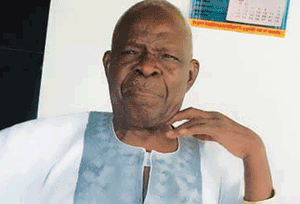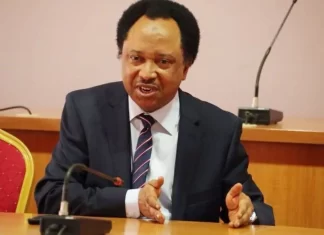President, Yoruba Council of Elders (YCE), who was Military Governor of defunct Western Region, General ADEYINKA ADEBAYO, speaks with Assistant Editor (South West), MUYIWA OLALEYE, on his role in the release of Obafemi Awolowo from prison, perceived Yoruba marginalisation and security challenges in the country, among other issues.
You were governor of defunct Western Region and a leading light in the movement that led to the creation of the six states in the South West. How were you able to actualise the feat?
It is true that I was governor of Western Region, which is now split into six states. At the time we were asking for states, other regions were asking for states as well. We thought that creating more states was a good thing because it would help the states economically, spread the economy of the region, bring development quicker, and then enable the people to work harder for their states. I think this is what we should still do.
What we should do now is to develop the economy, because if we do, it will give employment to our youths coming out of school and make people work harder than before.
Doing what you have said has informed the move by governors of South West states to push for regional integration, so as to evolve a programme that will grow the economy of the region. But some people see it from ethnic angle and argue that the move is not good for a united Nigeria. How do you link the two?
People should think more of the development of the region/states via the overall development of our nation than about ethnicity. We have gone far ahead of ethnicity in this country and that should be taken away from our minds whenever we are talking about things that will help us grow as components of the national entity. We must think about development of our individual regional areas, but we must also keep ourselves together as a nation.
The Yoruba have been alleging marginalisation in present day Nigeria. What is your take on this allegation?
The issue of marginalisation has been a general phenomenon of most regions. What I would say is that they should forget about whether or not we are marginalised and face how we can develop ourselves as a component part of the national entity. We must develop the country; and the way to develop the country is to get the states to work. The first step to developing a nation is to develop oneself. When you do that and some of your products get to other areas, you then must ask for your entitlements from the centre as a result of your contribution to the collective building of the nation.
We are in a federal system and we have states within the federation. Therefore, whatever is due to each state must be given to it. I think it would be unfair to the Yoruba people for them to be subjected to marginalisation to the point that we shout that the federal government has not given us our entitlements, whereas we are supposed to be part and parcel of the government.
Alaafin of Oyo, Oba Lamidi Adeyemi, recently accused former President Olusegun Obasanjo of being responsible for the plight of the Yoruba, saying he did not do much for the race. How would you look at the allegation?
I am not prepared to comment on what Alaafin of Oyo said. Obasanjo was president of the country (for eight years). And as president, he was in charge of development of the entire country. Obasanjo was not doing it all alone. He had a team working with him and for the development of each area within the federation. So, one should not be blaming Obasanjo now. Why did you people not shout then when he was there, that he was not doing the right thing for the Yoruba race?
I am not saying that Yoruba people have been given all their due, but one must not put the blame on Obasanjo because he was a Yoruba man. At the same time, being a Yoruba leader and president of the country almost concurrently, he should not be working on his own tribe alone at the expense of others. That would have made it worse now that the people are talking about it because he would have breached the leadership trust that was put in him.
How would you advise President Goodluck Jonathan on the issue?
President Jonathan has started well by pardoning the Generals (of Yoruba extraction) and I can only advise him to complete it by ensuring that the gazette regarding their pardon is published on time, so that the grey areas due to conflicting media reports as to who and who have benefited will be cleared and the Generals restored finally to their normal lives, with full enjoyment of their entitlements.
These are Generals that have contributed their quotas to the building of the nation. For instance, General Oladipo Diya is a good man; a good Yoruba man both inside and outside the military. The same thing goes for General Tajudeen Olanrewaju, the late General Abdulkareem Adisa and others.
In the first place, there was nothing they did that was bad so as to warrant that sentence. But we thank God now that the president has done what is necessary and pardon has been issued. But I am also aware that the Army authority has not been able to effect the release of their entitlements because of either the delay in the release of the gazette or that the presidency has not officially informed it. This makes it necessary that President Jonathan should see this as a major component of the laudable effort he is making in ensuring that things get better in this country, and he should cause all those involved in the release of the gazette to do so without delay.
Most Nigerians are not comfortable with the security challenges facing the country. If it is not Boko Haram, it is militants kidnapping people in the Niger Delta or cultists killing police officers. How do you feel at the disturbing development?
As far as security in Nigeria is concerned, it is the responsibility of the federal government to ensure the security of lives and property, and the states to report whatever security challenges facing their respective domains to the federal government, as a way of putting a superb security measure in place. By this I mean that security is a participatory duty, that, though it is the responsibility of the federal government to ensure that every good Nigerian has a role to play. The federal government will not be everywhere; they will not be at the grassroots. What are those other people doing? How are they taking proper care of their domains to ensure that behaviours that are alien to their various communities are checked?
That takes us to the issue of corruption. Is it that government has not done enough to tackle the scourge?
The fight against corruption is the responsibility of one, the government of the federation; two, the governments of the states; and individuals. Corruption is a disease that must be vigorously tackled by everybody.
The issue of power in 2015 is already heating up the polity. The Igbo are clamouring that it is their turn to produce the president; the Niger Delta activists are insisting that President Jonathan must have a second term; yet the Northern Elders Forum (NEF) has made clear its position that power must shift to the North in 2015. What do you think of the issue?
We do not know ourselves much yet; therefore we must continue to work together. We should continue to bring everybody to work together to get the right leadership. It does not matter where the leadership comes from, but it must not come from one place all the time. At any rate, leadership should go to the adequately qualified, efficient and honest person. At the same time, we must not forget other areas.
Your administration in the Western Region facilitated the release of Obafemi Awolowo from prison, after he had been convicted of treason. How did you arrive at that decision?
We arrived at that decision because we discovered that there was no need to put him in prison in the first instance. The old man did a lot of good works for the country, for the Western Region and, when the military took over from the civilian regime that put him in prison, it was the duty of the military regime in power to release him. That was what we did. I worked on the military on the need to release him. I recommended his release and he was released. And when we wanted to bring some civilians into the military government, we felt he would be very useful in the regime, and it turned out that he stood out of the pack. We brought him into the military government and he did a lot of good jobs for us there. He never disappointed us, and we thank God he did not.
Was it based on your recommendation that he became Federal Commissioner for Finance?
Yes, based on the recommendation of the government, he became the Federal Commissioner for Finance and he did very well in that position and improved the economy of the country.














